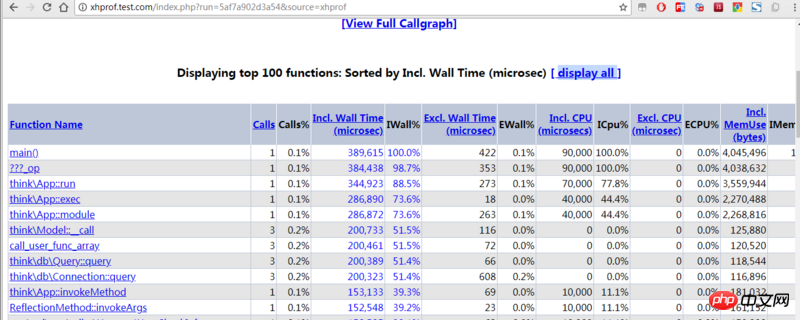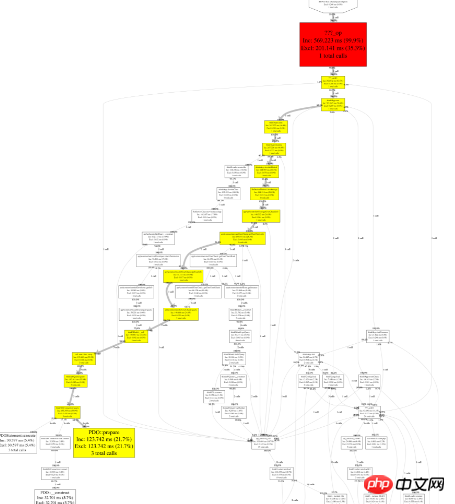
wget http://pecl.php.net/get/xhprof-0.9.4.tgz tar zxf xhprof-0.9.4.tgz cd xhprof-0.9.4/extension/ sudo phpize ./configure sudo make sudo make install cd ../
Configure php.ini
[xhprof] extension=xhprof.so xhprof.output_dir=/tmp
Note: xhprof has not been updated for a long time. As of now, it does not support php7. php7 can use https://github. com/phacility/….
You need to copy the two directories in the xhprof compressed package to the specified directory (assuming it is defined to /work/xhprof/):
mkdir /work/xhprof/ cp -a xhprof_html/ /work/xhprof/ cp -a xhprof_lib/ /work/xhprof/
Then add in the entry file of the project framework:
<div class="code" style="position:relative; padding:0px; margin:0px;"><div class="code" style="position:relative; padding:0px; margin:0px;"><pre class="brush:php;toolbar:false">xhprof_enable(XHPROF_FLAGS_MEMORY | XHPROF_FLAGS_CPU); register_shutdown_function(function() { $xhprof_data = xhprof_disable(); if (function_exists(&#39;fastcgi_finish_request&#39;)){ fastcgi_finish_request(); } include_once "/work/xhprof/xhprof_lib/utils/xhprof_lib.php"; include_once "/work/xhprof/xhprof_lib/utils/xhprof_runs.php"; $xhprof_runs = new XHProfRuns_Default(); $run_id = $xhprof_runs->save_run($xhprof_data, &#39;xhprof&#39;); });</pre><div class="contentsignin">Copy after login</div></div><div class="contentsignin">Copy after login</div></div>Code analysis: $xhprof_data records all function call times and CPU memory consumption during program running. The specific recorded indicators can be controlled through the parameters of xhprof_enable. The currently supported parameters are:
##HPROF_FLAGS_NO_BUILTINS Skip all built-in (internal) functions.
XHPROF_FLAGS_CPU Adds CPU data to the output performance data.
XHPROF_FLAGS_MEMORY Add memory data to the output performance data.
XHProfRuns_Default, serialize $xhprof_data and save it to a certain directory, you can output the results to the current directory through XHProfRuns_Default(__DIR__). If not specified, xhprof.output_dir## in the php.ini configuration file will be read. #, if still not specified, it will be output to /tmp.
and xhprof_disable appear in pairs, one is at the front of the code running, and the other is at the end. In the middle is the code to be analyzed. After the above configuration, if we subsequently request the project interface, xhprof will analyze the CPU, memory, time consumption, etc. during the request process. The log is saved in the
directory. Configuring web
xhprof.test.com.conf
server {
listen 80;
server_name xhprof.test.com;
root /work/xhprof/xhprof_html;
index index.html index.php;
location ~ \.php$ {
fastcgi_pass 127.0.0.1:9000;
fastcgi_index index.php;
fastcgi_param SCRIPT_FILENAME $document_root$fastcgi_script_name;
include fastcgi_params;
}
}and then configure the virtual host xhprof.test.com. Restart nginx and open xhprof.test.com to see the effect:

 is listed in the default UI :
is listed in the default UI :
yum install -y libpng yum install -y graphviz
Effect:
 Non-intrusive introduction of xhprof
Non-intrusive introduction of xhprof
directory: <div class="code" style="position:relative; padding:0px; margin:0px;"><div class="code" style="position:relative; padding:0px; margin:0px;"><pre class="brush:php;toolbar:false">xhprof_enable(XHPROF_FLAGS_MEMORY | XHPROF_FLAGS_CPU);
register_shutdown_function(function() {
$xhprof_data = xhprof_disable();
if (function_exists(&#39;fastcgi_finish_request&#39;)){
fastcgi_finish_request();
}
include_once "/work/xhprof/xhprof_lib/utils/xhprof_lib.php";
include_once "/work/xhprof/xhprof_lib/utils/xhprof_runs.php";
$xhprof_runs = new XHProfRuns_Default();
$run_id = $xhprof_runs->save_run($xhprof_data, &#39;xhprof&#39;);
});</pre><div class="contentsignin">Copy after login</div></div><div class="contentsignin">Copy after login</div></div>Use the automatic loading function of PHP before executing the code Inject this file, edit php.ini:
auto_prepend_file = /work/xhprof/xhprof.inc.php
and then restart the PHP service. This will take effect for everyone using this php environment.
Or you can also write it into the nginx configuration of the specified project:
jifen.cc.conflocation ~ \.php$ {
fastcgi_pass 127.0.0.1:9000;
fastcgi_index index.php;
fastcgi_param SCRIPT_FILENAME $document_root$fastcgi_script_name;
fastcgi_param PHP_VALUE "auto_prepend_file=/work/xhprof/xhprof.inc.php";
include fastcgi_params;
}Files included via auto_prepend_file and auto_append_file will be parsed in this mode, but there are some restrictions, such as functions must be defined before being called.
Modify the sampling frequency
xhprof.inc.php
<?php
$profiling = !(mt_rand()%9);
if($profiling) xhprof_enable(XHPROF_FLAGS_MEMORY | XHPROF_FLAGS_CPU);
register_shutdown_function(function() use($profiling) {
if($profiling){
$xhprof_data = xhprof_disable();
if (function_exists('fastcgi_finish_request')){
fastcgi_finish_request();
}
include_once "/work/xhprof/xhprof_lib/utils/xhprof_lib.php";
include_once "/work/xhprof/xhprof_lib/utils/xhprof_runs.php";
$xhprof_runs = new XHProfRuns_Default();
$xhprof_runs->save_run($xhprof_data, 'xhprof');
}
});Summary
Related recommendations:
Notes on php-fpm parameter configuration of php7The above is the detailed content of Method 1 of using XHProf to analyze PHP performance bottlenecks. For more information, please follow other related articles on the PHP Chinese website!




